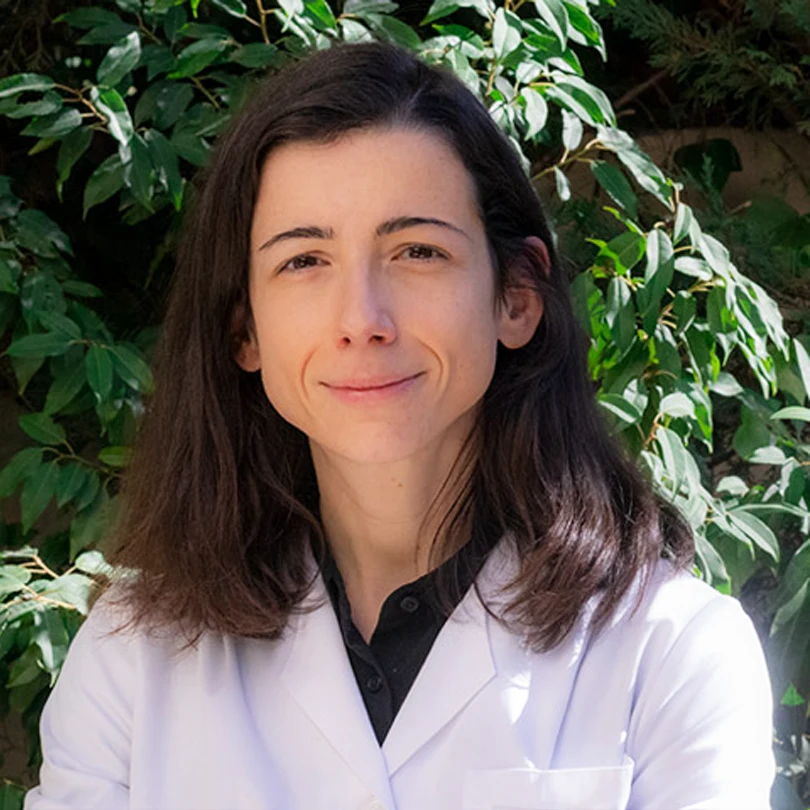Dra. Ángela Llaneza
Restless and curious to know, understand and investigate, Dr. Llaneza did not initially choose a medical path. However, she was fascinated by gynaecology because it is a very extensive specialty that brings together her scientific concerns and professional interests.
She is the scientific director of the clinic and praises its trajectory, in which she has been committed to technology and research, which she is promoting from the Tambre Foundation. As well as the team behind the daily effort to achieve each patient’s pregnancy.
Gynaecologist Fertility Specialist
- Degree in Medicine from the University of Oviedo (2006-2012).
- Specialisation in Gynaecology and Obstetrics at the Hospital Clínico San Carlos de Madrid (2013-2017).
- Master’s Degree in Human Reproduction at Complutense University and Spanish Fertility Society (2015-2016).
- Degree in Obstetric and Gynaecological Ultrasound at the Complutense University of Madrid. Dedicated to Reproductive Medicine since 2017.
“Uncertainty, the cost of treatment and the psychological toll are the challenges fertility patients face”
Learn more about me
I come from a family of doctors and medicine and the doctor’s worldview have always been present in my life. I never wanted to be a doctor but when I had to choose a career I realised that the knowledge I wanted to have could only be acquired by studying medicine.
I went into my career thinking I was going to be an endocrinologist, which are the doctors who deal with the endocrine system, hormones and communication within the body so to speak. I thought I wouldn’t like obstetrics and gynaecology, but as soon as we started the course I was fascinated. It is a specialty that allows us to get involved with the integral care of women in all stages of life and also allows us to help bring life into the world. Gynaecology is a very extensive specialty with several specialties and one of them is endocrinology and reproductive medicine. It used to be the great unknown for resident physicians. From the moment I got there, I knew it was what I wanted to do because it allowed me to bring together several scientific concerns and professional interests.
Tambre is a clinic that is part of the history of assisted reproduction in Spain, with more than 40 years of experience. All this learning has been transmitted and persists today in the laboratory, a fundamental element of any high-level centre. At the clinical level, we have a staff of physicians who are passionate about assisted reproduction. They are subspecialised in this specialty, and have accumulated years of experience. They have been trained by legends in this field. As well as having learned from the best, they have the passion to keep studying constantly.
We focus on comprehensive patient care, their success is our success, but we cannot achieve success at any cost. We are committed to technology and various formulas to make the search for and achievement of pregnancy as quick and painless as possible.
I remember my first positive beta and numerous other success stories clearly. Positive betas sometimes come sooner and sometimes take longer, but they are always a great joy. You can’t get used to them because behind every positive beta there is a unique story, as each patient is different.
There are 3: the first is the uncertainty of the treatments, when the positive result will come, and going through one step after another; the second is the cost, they are expensive treatments because a lot of investment in technology is necessary to have a good laboratory, to work with maximum safety and to offer maximum guarantees with the gametes and embryos; and the third is the psychological wear and tear derived from the two previous factors.
I distinctly remember all the cases in which we had to fight for that positive beta and for that baby to finally make it home. I am not proud personally because it is a team effort, I am happy that these patients have achieved their goal.
Research in the clinic is essential because we need to improve our knowledge of the procedures we do every day. We need to know more about the physiology and pathophysiology of embryo implantation, we need to improve gamete and embryo selection, improve predictions and estimates because from these gaps come inefficiencies in treatments that affect the psychological and emotional cost for our patients.
I believe deeply in science. I am very critical of inefficiencies, but experience and study give me tools to be able to look for solutions and move forward helping patients, and I know that in most cases, by doing certain things, the baby will come. In addition, you simply have to feel strong when you have people in front of you who are so determined to achieve their dream of parenthood.
I enjoy spending time with my family and my pets. I like to take long walks in nature. I’m always listening to music, I try to read as much as I can and I’m a big movie lover.

